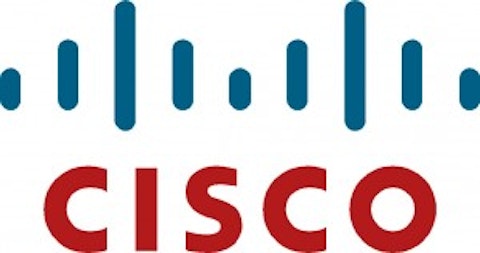Cisco Systems, Inc. (NASDAQ:CSCO) has been doing well so far in its fiscal year (the third quarter of which ended in April 2013). In its most recent 10-Q the company reported that revenue had risen 5% in fiscal Q3 versus a year earlier, in line with the improvements in Cisco’s top line from the first half of the FY. Pretax margins have stayed more or less constant, resulting in similar growth rates in pretax income over both periods (reported earnings have grown at a considerably faster pace, but this is due to lower effective tax rates which are likely not sustainable sources of future growth). Sales growth has been concentrated in the Americas, with each of Cisco Systems, Inc. (NASDAQ:CSCO)’s other two geographic segments (Europe/Middle East/Africa and Asia Pacific/Japan China) seeing little change in revenue. Cash flow from operations was $8.9 billion; Cisco used more than that amount between acquisitions, capex, dividends, and repurchases, but still had $47 billion in cash, cash equivalents, and investments on its balance sheet.

At its current valuation Cisco Systems, Inc. (NASDAQ:CSCO) trades at 14 times trailing earnings. We can see that the business is growing at mid-single digit rates, ignoring the lower effective tax rate for these purposes). Assuming that share buybacks will continue as well, supplementing increases in net income, that is cheap enough to make the stock somewhat interesting. Wall Street analysts predict $2.11 in EPS for the forward fiscal year ending in July 2014, which equates to a forward P/E of 12- clearly in prospective value territory when Cisco Systems, Inc. (NASDAQ:CSCO)’s cash balance is considered.
We track quarterly 13F filings from hundreds of hedge funds and other notable investors as part of our work developing investment strategies; for example, we have found that the most popular small cap stocks among hedge funds generate an average excess return of 18 percentage points per year (learn more about our small cap strategy). Our database shows that billionaire Ken Fisher’s Fisher Asset Management had more than 36 million shares of Cisco in its portfolio at the end of March (find Fisher’s favorite stocks). Another major Cisco Systems, Inc. (NASDAQ:CSCO) shareholder was Platinum Asset Management, run by billionaire Kerr Neilson; Platinum reported ownership of a little over 10 million shares (see Neilson’s stock picks).
Peers for Cisco Systems, Inc. (NASDAQ:CSCO) include Alcatel Lucent SA (ADR) (NYSE:ALU), Juniper Networks, Inc. (NYSE:JNPR), Palo Alto Networks Inc (NYSE:PANW), and Riverbed Technology, Inc. (NASDAQ:RVBD). Alcatel-Lucent is unprofitable on a trailing basis, and while analysts expect losses to narrow next year the consensus is that the company will remain in the red.
Revenue has been showing little change, so it’s likely that any improvement at Alcatel-Lucent will come from cost reductions. The stock has rallied over the last year, rising 80%. Palo Alto has seen very low earnings numbers as well, and even though the sell-side expects EPS to rise next year the forward P/E is more than 100. Revenue growth was over 50% in its most recent quarter compared to the same period in the previous fiscal year, so the business is expanding rapidly, but that valuation still doesn’t seem attractive.
While Juniper Networks and Riverbed are also expensive in trailing earnings terms, these stocks trade between 14 and 16 times forward earnings estimates and so if they can hit analyst targets they should be at least somewhat reasonable priced (though they’d still need to grow from that point in order to look like good values). Juniper’s profits have been up strongly in percentage terms, but revenue growth has been only modest and so we’d be skeptical that the company can increase earnings at decent rates in the future; it’s also highly exposed to the overall economy with a beta of 2.3. Riverbed features an even higher beta, at 2.6, and so clearly neither stock would be a good pick for investors worried about a potential bear market. Riverbed did see strong sales growth in its last quarterly report compared to the first quarter of 2012, and analysts are bullish over the long term with a five-year PEG ratio below 1, but it should probably be avoided until actual earnings numbers start looking better.
As a result none of Cisco’s peers look that interesting at this time. The stock itself, however, is trading at a reasonable trailing P/E (particularly compared to these similar companies) and there has been modest growth recently with enough cash flow to supplement future earnings growth by buying back shares. As such it appears worthy of further consideration.
Disclosure: I own no shares of any stocks mentioned in this article.





